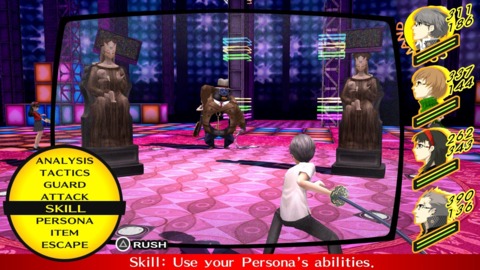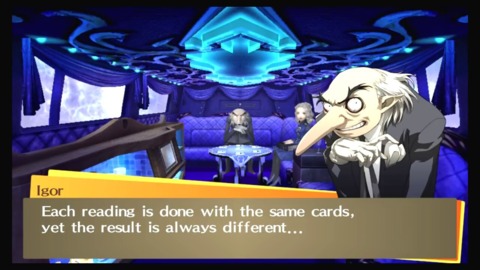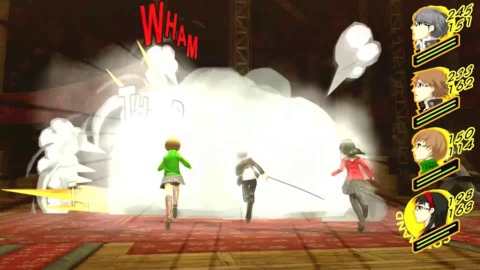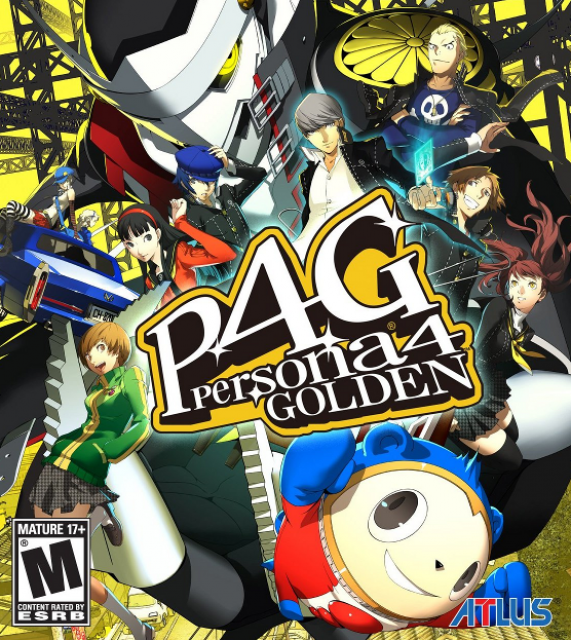Unearthing the Shadows of the Soul

In the ever-expanding realm of video games, there are titles that entertain, titles that challenge, and titles that touch the soul. Amongst these, Persona 4 Golden stands as an exemplar of modern storytelling, weaving a captivating narrative tapestry that transcends the boundaries of the medium. With its combination of striking visuals, compelling characters, and thought-provoking themes, this masterpiece redefines what it means to experience interactive storytelling. A testament to the immense potential of video games as an art form, Persona 4 Golden is an unforgettable journey through the human psyche and the shadows that lurk within.
As we delve into this remarkable work of digital art, it is imperative to understand its roots. Persona 4 Golden is an enhanced version of the original Persona 4 on PlayStation 2, released for the PlayStation Vita in 2012 and later on PC, PS4, Xbox and PS5. Developed by the renowned Atlus, the game has earned its place in the pantheon of RPG classics and has garnered a loyal and fervent following. This review will examine its various elements, from its visual presentation and gameplay mechanics to its rich narrative and character development.

One of the first things that strikes you about Persona 4 Golden is its distinctive visual style. The game's graphics are beautifully animated, and its vivid, anime-inspired art direction brings the fictional town of Inaba to life. From the serene countryside to the bustling shopping district, every location is meticulously crafted, exuding a warm and inviting charm. The attention to detail is apparent in the picturesque environments, each of which contributes to the game's immersive atmosphere.
The character design is equally impressive. The main cast of Persona 4 Golden is brought to life with expressive, hand-drawn character portraits. These are accompanied by meticulously designed personas, supernatural beings that represent the inner selves of the characters. The personas are a striking blend of myth and modernity, each possessing its own unique aesthetic and symbolic qualities. This visual flair extends to the animated cutscenes and persona-summoning sequences, which are both visually stunning and emotionally resonant.
Persona 4 Golden's commitment to visual storytelling is truly commendable. The characters' facial expressions, body language, and actions convey a wealth of information about their inner struggles and relationships, enriching the narrative on a profound level. The use of visual symbolism is also prominent, with the game employing colour, symbolism, and visual metaphors to great effect. This approach to storytelling goes beyond mere aesthetics; it enhances the player's emotional connection to the characters and their journey.

The soundtrack is another triumph, composed by the talented Shoji Meguro. The music is a dynamic mix of various genres, seamlessly shifting to match the tone and atmosphere of each scene. From the peppy J-pop tunes that underscore the everyday life of the characters to the dark, pulsating tracks that accompany battles with shadowy creatures, the soundtrack is an integral part of the game's storytelling. It complements the emotions of the moment and adds depth to the player's immersion.
The gameplay in Persona 4 Golden is a masterclass in combining traditional RPG elements with social simulation. The game is divided into two distinct parts: the daily life in Inaba and the adventure in the mysterious world inside the TV. The daily life section focuses on character interactions, time management, and building relationships with the people in Inaba. Here, you can attend school, take on part-time jobs, go fishing, and even explore a dilapidated shopping district. These activities are not mere distractions; they serve to strengthen your social bonds and enhance the characters' growth.
The social simulation aspect is perhaps one of Persona 4 Golden's most compelling features. The game encourages players to form and deepen relationships with various characters, and these connections directly impact your progression in the game. As your bonds grow stronger, you unlock new personas and abilities, allowing you to craft a unique playstyle. This mechanic brilliantly reinforces the game's central theme of facing one's inner demons, as the strength of your friendships is directly tied to your power in the mysterious world within the TV.

The other half of the gameplay is set within the TV world, where the characters confront their inner selves and face off against their shadowy counterparts. These sequences are the core of the game's dungeon-crawling elements. Here, you explore unique dungeons, each reflecting the psyche of the individual characters. The procedural generation of dungeon layouts keeps the experience fresh, ensuring that you're never quite sure what to expect. The turn-based combat system is intuitive yet strategic, demanding that players think tactically when selecting their personas, skills, and party members.
Persona 4 Golden's battle system is nothing short of exhilarating. The player commands a party of characters who can summon and control personas, each with their own elemental strengths and weaknesses. The game encourages experimentation and adaptation, requiring players to exploit enemy vulnerabilities and plan their attacks carefully. The result is a satisfying blend of strategy and teamwork, ensuring that battles are not merely a means to an end but an engaging experience in their own right.
One of the standout features of the game is its unique and challenging negotiations with enemies. Unlike most RPGs, where you simply defeat foes, in Persona 4 Golden, you can strike up a conversation with the creatures you encounter in battle. This negotiation system, known as "One More," is a brilliant addition. It allows players to extract valuable items, personas, or even request assistance in exchange for a tactical advantage in battle. It adds an extra layer of depth and unpredictability to encounters, making each battle a dynamic and engaging experience.
The fusion system is another highlight of the gameplay. As you collect personas, you can combine them to create new, more powerful ones. The process is like crafting your own arsenal of mythological creatures, each with its own strengths and weaknesses. Experimenting with persona fusion is not only satisfying but also essential for progressing through the game's increasingly challenging dungeons. The fusion system also encourages players to learn about various mythologies and folklore, adding an educational dimension to the gameplay.

Throughout the game, Persona 4 Golden strikes a harmonious balance between gameplay and storytelling. While many RPGs lean heavily on combat, Persona 4 Golden seamlessly blends its slice-of-life aspects with its dungeon-crawling mechanics. This synergy ensures that every moment in the game is meaningful and contributes to the overarching narrative. The sense of progress and accomplishment you feel as your relationships deepen and your party grows in power is incredibly rewarding.
At its core, Persona 4 Golden is a game about self-discovery and the human condition. The characters' inner demons, represented by the shadowy creatures in the TV world, serve as metaphors for their own struggles, insecurities, and suppressed emotions. The game encourages players to confront these shadows head-on, to accept them as a part of themselves, and to grow from these experiences. This overarching theme of self-acceptance and personal growth resonates deeply with players, making the characters' journeys relatable and emotionally powerful.
The narrative of Persona 4 Golden is a masterclass in character development. The central character, Yu Narukami, is a silent protagonist, allowing players to project themselves into his role. His interactions with the diverse cast of characters in Inaba, each dealing with their own inner conflicts, provide a rich tapestry of storytelling. The game explores themes of identity, truth, and the masks we wear in society. It delves into the complexities of human relationships, including friendship, love, and family, and doesn't shy away from addressing sensitive topics such as loneliness, rejection, and the consequences of one's actions.
The writing in Persona 4 Golden is top-notch, with sharp dialogue and well-developed characters. Each character feels like a fully realised individual with their own quirks, motivations, and personal growth arcs. As you spend time with them, you'll witness their struggles, fears, and insecurities, and help them overcome their inner demons. The emotional depth and authenticity of these characters are a testament to the game's storytelling prowess.
The central mystery of the game, the investigation into a series of murders in Inaba, is an engrossing narrative hook. As you uncover clues and confront the shadows within the TV world, the story becomes increasingly intricate and suspenseful. The game keeps you guessing until the very end, and its multiple endings offer a rewarding sense of closure for the characters and their stories.

Persona 4 Golden's storytelling is not limited to its main narrative. The game features numerous side quests and optional events that provide further insight into the lives of Inaba's residents and deepen your connections with them. These side stories are more than just distractions; they enhance the overall narrative by reinforcing the themes of the game and allowing players to forge a stronger bond with the characters. These stories also have their own emotional weight, often dealing with issues such as unrequited love, bullying, and personal growth.
In addition to its compelling character-driven narrative, Persona 4 Golden explores the notion of personal truth and the masks people wear to fit into society. The contrast between the characters' "public" and "inner" selves is a central theme. The TV world, with its surreal landscapes and monstrous inhabitants, serves as a symbolic representation of the subconscious, where the truth is revealed. This duality between the everyday world and the TV world creates a profound exploration of identity and the consequences of denying one's true self.
Persona 4 Golden is not without its flaws, but they are minuscule in comparison to its many strengths. Some players may find the pacing to be slow, especially during the initial segments of the game. However, this deliberate pacing allows for a deep connection with the characters and a gradual immersion into the world of Inaba. The voice acting, while generally excellent, may not be to everyone's taste, but the ability to choose between Japanese and English voiceovers ensures that players can select their preferred experience.

Persona 4 Golden is an absolute triumph in the world of video games. It stands as a testament to the potential of the medium as an art form, blending stunning visuals, engaging gameplay, and a narrative that delves deep into the human condition. With its compelling characters, thought-provoking themes, and expertly crafted world, the game offers a rich and emotionally resonant experience that will stay with players long after the credits roll.
The game's fusion of storytelling and gameplay is nothing short of remarkable, encouraging players to explore the human psyche, confront their own shadows, and ultimately find acceptance and growth within themselves. Its vibrant visuals, mesmerising soundtrack, and expertly written characters make Persona 4 Golden a must-play for anyone who values storytelling in video games. It transcends the boundaries of the medium and stands as a shining example of what games can achieve as a form of art.
In the end, Persona 4 Golden is not just a game; it's a transformative experience. It challenges players to look deep within themselves, confront their inner demons, and emerge stronger for the journey. Few games can claim to have such a profound impact, making Persona 4 Golden a modern masterpiece that deserves every bit of its praise and recognition. If you have any love for storytelling, character development, or the power of interactive art, Persona 4 Golden is a game you simply cannot afford to miss.
